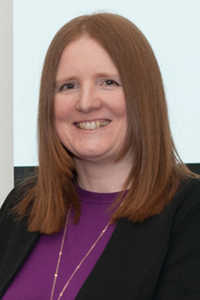
Lisa Cromar
Counsellor, Trainer and Author - Specialising in Autism
PhD Student at the University of Chester
Co-Founder, Counsellors Working With Neurodiversity
Tel 07572112030
Hi, I am Lisa Cromar. I am a qualified Person-Centred Counsellor and am studying towards a PhD whereby I aim to improve research in counselling and autism.
In my academic career, I am honoured to have received some awards, including a Professional Learner of the Year Award from Cheshire College South and West and a Dean’s Award and the Vice-Chancellor’s Award from the University of Derby. I have also appeared on Anna Kennedy’s Autism Hour for the Women’s Radio Show (available on podcast).
I have a personal interest in autism in large part because I found out at the age of 37 that I am autistic (my formal diagnosis being Asperger's Syndrome).
This revelation came about because my eldest son, Harry (now 15) had struggles growing up due to autistic traits, including difficulties with behaviour regulation and socialising. In the process of researching autism and trying to understand his needs, I started to identify traits within myself. It is very common for people my age to discover they are autistic following the discovery of it in a child. So in 2016, I am proud to say my son and I both received a diagnosis of autism.
I have gone on to have two more children. My daughter Hazel, now 8, is starting to show traits of autism. It is common in girls (and some boys), for it to become more obvious at a later stage as friendships become more complicated and they start to lag behind their peers socially. This is the case for my daughter and her anxiety around other people, school and sensory sensitivities are increasing.
I also have another son Lewis, now 6, who I realised very early on was autistic. He was delayed in some of his key development in areas which indicate autism, like not pointing by the age of 18 months old for example. He also has delayed speech, and when it did start to develop, it came out as echolalia/scripting. This means he only repeated words or phrases; he didn’t speak spontaneously. It was quite ingenious--he learnt how to communicate his needs using only phrases from nursery rhymes. He had a whole repertoire of songs to do this.
Professionally I specialise in working with autistic clients at a local college. Additionally, I provide autism awareness workshops training counsellors in how to make counselling more accessible to this client group, increasing counsellor confidence in working with this group which is currently known to be generally low.
I have presented at conferences alongside Janet Tolan, Pete Sanders, Mick Cooper (The Person-Centred Trainers Conference) and Andrew Reeves (The University of Salford Creative Therapies Conference). During lockdown, I have provided online training for counselling organisations, and at conferences for BACP Private Practice and the Creative Counsellors Association.
I am the author of the pioneering literature review: Exploring the Efficacy of Person-Centred Counselling (PCC) for Autistic People, published in the spring 2019 edition of The Person Centred Quarterly (PCQ) and as a chapter in the Neurodiversity Reader, Pavilion Publishing and Media Ltd. The review highlights that although the research in this area is minimal, what is available, demonstrates that PCC, with adaptations, is a highly effective modality for the autistic client group.
The review highlights research which shows that Rogers’ (1967) core conditions; empathy, unconditional positive regards, congruence and the relationship are vital for positive therapeutic outcomes when working with autistic clients. It also supports research, which found that autistic clients experience extreme levels of conditions of worth, in large part due to failing to comfortably ‘fit in’ to societal expectations. PCC is known to be highly effective for addressing conditions of worth. I have also written an article for the Creative Counsellors Club, called Creative Counselling for Autistic Clients.
I have cofounded the Facebook forum ‘Counsellors Working for Neurodivergence.’ We aim to raise awareness of autism on this page and bring counsellors together across the field to advance knowledge of autism in counselling. This is a lively page which has over 1500 members.
Although my primary modality is Person-Centred Counselling, my awareness training can help counsellors of any modality. In fact I have provided bespoke training to driving instructors before.
My eventual career goal is to assume responsibility for pioneering a version of person-centred counselling for autistic people. I aim to play my part in making the world a better place to live when autistic.
Online Workshop
Due to the stigma autistic people often feel in society, we sometimes mask our autistic identity and attempt to blend in and hide our difference.
This masking usually starts in childhood as a survival tactic to avoid standing out and bullying, this follows through to adolescence and adulthood.
Living incongruently can lead to significant mental health problems and sadly autistic people who mask are statistically more likely to suffer depression and have a higher risk of suicide.
This workshop will aim to promote the importance of autistic people having a positive autistic identity (Cooper, Smith and Russell, 2017), something which society and counsellors can play a part in helping us achieve. A creative counselling intervention will be demonstrated to help clients unmask their autistic identity and to understand how much energy masking takes.
The aims of the workshop are as follows:
- Deciphering masking behaviours. What is the purpose? What is the damage?
- Provide an insider understanding of autistic masking and compensation.
- To provide a creative counselling intervention which can be used to support a client unmask.
- Accepting and celebrating autism and neurodivergence.
References
Cooper, K., Smith, L., & Russell, A. (2017). Social identity, self-esteem, and mental health in autism. European Journal Of Social Psychology, 47(7), 844-854. doi: 10.1002/ejsp.2297

